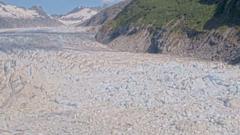The visit of Vladimir Putin and Donald Trump raises eyebrows among Alaskans, reflecting local sentiments toward geopolitical tensions.
Alaskans React to High-Stakes Putin-Trump Meeting

Alaskans React to High-Stakes Putin-Trump Meeting
Concerns and protests emerge as global leaders arrive in Anchorage.
Hanna Correa stands amidst a crowd of protesters in Anchorage, flanked by Ukrainian flags, expressing her disbelief that "Putin is supposed to be in jail, and he just comes to Alaska like that." The 40-year-old, who left Ukraine in 2019, is heartened by local support as US President Donald Trump and Russian President Vladimir Putin prepare to convene at Joint Base Elmendorf-Richardson, just a half-hour’s drive from her home. While she is proud of the turnout, she laments that Ukraine's leader, Volodymyr Zelensky, is not part of the discussions.
Among the demonstrators is Christopher Kelliher, a 53-year-old native Alaskan and military veteran, who states, "It’s gross, it makes you want to take a shower." He voices frustration over Putin’s presence in the state, criticizing the President for what he perceives as capitulation.
The significance of the summit is amplified by Alaska's storied history with Russia, dating back to the 1867 purchase of the territory for $7.2 million—a venture once derided as “Seward’s Folly.” Alaska’s rich natural resources later shifted perceptions of value. Influential cultural symbols from Russian heritage remain, like the St Tikhon Orthodox Church, where Reverend Nicholas Cragle shared his sadness about the rift causing pain within the community and hopes for peace.
Fishermen along the city’s outskirts express their perspectives too. Don Cressley, a local angler on a fishing trip, supports the summit while wishing for Zelensky’s involvement to expedite resolution to the ongoing conflict. He emphasizes the war's destructive impact on civilians and communities.
Geopolitical tensions resonate deeply as Alaskans live closer to Russian territory than the continental U.S.; ongoing military activities in the region heighten apprehensions. Anchorage resident Russell Wilson reflects on the complex situation while fishing, noting, "If the president doesn't put the hammer down, we could be the next Ukraine."
Meanwhile, not all share worries about invasion; Kelliher, for example, downplays the threat, asserting that "everybody in Alaska owns a gun," indicating a sense of local security among residents.
As the world watches, the hopes and anxieties of Alaskans demonstrate the nuanced dynamics of local perspectives on international politics.
Among the demonstrators is Christopher Kelliher, a 53-year-old native Alaskan and military veteran, who states, "It’s gross, it makes you want to take a shower." He voices frustration over Putin’s presence in the state, criticizing the President for what he perceives as capitulation.
The significance of the summit is amplified by Alaska's storied history with Russia, dating back to the 1867 purchase of the territory for $7.2 million—a venture once derided as “Seward’s Folly.” Alaska’s rich natural resources later shifted perceptions of value. Influential cultural symbols from Russian heritage remain, like the St Tikhon Orthodox Church, where Reverend Nicholas Cragle shared his sadness about the rift causing pain within the community and hopes for peace.
Fishermen along the city’s outskirts express their perspectives too. Don Cressley, a local angler on a fishing trip, supports the summit while wishing for Zelensky’s involvement to expedite resolution to the ongoing conflict. He emphasizes the war's destructive impact on civilians and communities.
Geopolitical tensions resonate deeply as Alaskans live closer to Russian territory than the continental U.S.; ongoing military activities in the region heighten apprehensions. Anchorage resident Russell Wilson reflects on the complex situation while fishing, noting, "If the president doesn't put the hammer down, we could be the next Ukraine."
Meanwhile, not all share worries about invasion; Kelliher, for example, downplays the threat, asserting that "everybody in Alaska owns a gun," indicating a sense of local security among residents.
As the world watches, the hopes and anxieties of Alaskans demonstrate the nuanced dynamics of local perspectives on international politics.




















